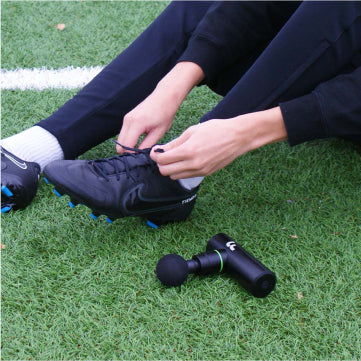Understanding the root causes of leg numbness is crucial to finding the right remedy.
Leg numbness is a common complaint among people of all ages and fitness levels.
This feeling of absence of sensation can occur anywhere on the legs and usually comes with other symptoms such as tingling, burning, and musculoskeletal pain.
People with numbness also usually experience a loss of strength and coordination. With these symptoms, finding ways to treat leg numbness is crucial to living a healthy and active lifestyle.
However, this begins with understanding the potential causes.
Yes, you read that right.
Having a clear idea of what could be causing your leg numbness is the first step in managing it.
To separate fact from fiction and provide you with good-to-know information, this post offers a comprehensive list of the 10 possible causes of leg numbness.
You'll also learn some tips on how to manage it. So read on to find out more.
Common Causes of Leg Numbness
Experiencing a feeling of numbness in the legs can occur for a variety of reasons.
Here are some of the most common causes:
1. Poor posture
Are you one to slouch when sitting or standing for extended periods?
If so, this could be to blame for your leg numbness.
Sitting or standing in an incorrect position for extended periods of time can put pressure on spinal nerves, causing them to become compressed and blood flow to be restricted.
This can lead to a feeling of uncomfortable numbness in your legs, particularly around the buttocks, calves, and thighs. Other symptoms, such as tingling and muscle weakness, may also be present.
2. Diabetes
A second reason people experience leg numbness is diabetes.
Diabetics often suffer from an acute condition known as "diabetic neuropathy," which is caused by high levels of blood sugar.
With high levels of glucose in the blood, nerve fibers within your feet and legs become inflamed and compressed. This can lead to a feeling of numbness in the legs and can also cause other signs of diabetes like tingling and needles sensation.
What's more, people with diabetes develop an increased risk of infection, which can also lead to numbness.
3. Alcohol use disorder
Excessive alcohol consumption can also lead to leg numbness.
Long-term overconsumption of this alcohol damages the nervous system and affects the function of nerves in the body, particularly the fibular nerves. With a lack of nerve signals, you may experience weakened muscles and poor coordination, as well as an annoying sensation that may feel like pins and needles.
What's more, people who drink excessively may also suffer from leg muscle cramps.
4. Herniated disk
Do you know that certain medical conditions can also lead to leg numbness?
One that can cause this symptom is a herniated disk.
A herniated disk occurs when a vertebral disc in the spine becomes damaged or ruptures. When this happens, the outer layer of the disc can push out and put pressure on the nerves.
This compression can lead to poor nerve functioning and a feeling of numbness. It's important to note that herniated disks are most common in the lower back and neck areas.
5. Pinched nerve

Just like a herniated disc, a pinched nerve can also cause leg numbness.
A pinched nerve occurs when the nerve becomes compressed or trapped between bones, ligaments, or tendons. Nerve compression interrupts its functioning and can cause numbness in the affected area.
For leg numbness, the most common pinched nerve is the sciatic nerve, which runs from the lower back down to the feet. When it gets compressed, it can lead to nerve damage and leg weakness.
6. Vitamin B12 deficiency
What you eat can also affect the functioning of your nervous system.
For leg numbness, one of the most common dietary deficiencies that can cause it is a lack of vitamin B12.
Vitamin B12 is a nutrient that helps the body produce healthy red blood cells, keep nerves functioning properly, and produce DNA. A lack of this vitamin can lead to a variety of health issues, including anemia (low red blood cell count) and nerve damage.
Other possible signs of a vitamin B12 deficiency include leg numbness as well as fatigue, weakness, and difficulty concentrating.
7. Peripheral artery disease
Widely known as PAD, peripheral artery disease is a condition that occurs when the peripheral nerves become narrowed or blocked due to plaque buildup.
This buildup restricts blood flow in your peripheral blood arteries and can lead to a feeling of numbness or pain.
If you are dealing with peripheral arterial disease, chances are you’ll be subject to leg numbness, leg cramps, and fatigue. Additional symptoms of this arterial disease can include cramping, fatigue, and a cold sensation in the feet.
8. Sciatica
Sciatica is a set of symptoms caused by compression of the sciatic nerve.
This nerve runs from the lower back down through the hips and buttocks and into the legs. Symptoms of sciatica include nerve pain and weak leg muscles that may worsen when sitting or standing for an extended period.
It can be caused by a herniated disk, spinal stenosis, or a tumor.
9. Fibromyalgia
This chronic condition is a disorder that affects the muscles and soft tissues in your body, causing chronic pain and fatigue.
Fibromyalgia sufferers often experience extreme tenderness in their legs, as well as shooting pains and muscle spasms.
This can lead to a feeling of chronic numbness or tingling in your tense muscles as the tissues become inflamed and irritated.
10. Multiple sclerosis
If you have multiple sclerosis (MS), chances are that you will also experience a feeling of numbness in your legs.
MS is an autoimmune disorder that affects the central nervous system and causes nerve damage within your body. This damage to the nerves can lead to a variety of symptoms, including leg numbness.
In some cases, people with this autoimmune disease may also experience muscle weakness, severe pain, and a loss of coordination.
These are just a few reasons why you may be experiencing episodes of leg numbness.
Whether you feel numbness from sitting too long, diabetes, alcohol abuse, a herniated disc, a pinched nerve, fibromyalgia, or multiple sclerosis, finding ways to avoid and manage these triggers is essential for your health.
That's what we'll be discussing next. Stay glued to the screen to learn just how you can manage these causes of numbness.
Managing the Causes of Leg Numbness
Finding ways to manage the causes of leg numbness is key to living a comfortable life.
This includes taking a break from activities that may cause the numbness, incorporating proper lifestyle factors, and keeping underlying conditions under control.
Let's have a close look at just how you can do this.
Practice good postural habits
Maintaining a healthy posture is one of the best ways to avoid episodes of leg numbness.
As we've learned, poor posture is a leading cause of leg numbness. That's why it's important to practice good posture habits to prevent the issue from occurring in the first place.
Simple steps like sitting up straight, using a supportive chair, and avoiding crossing your legs for extended periods can help keep your spine in alignment and prevent leg numbness.
Maintain a healthy weight
Keeping your health in check is one of the best ways to reduce leg numbness.
Being overweight or obese can put extra pressure on the spine, leading to possible causes of numbness like herniated discs and nerve compressions.
Diabetes - a potential cause of long-term numbness - is also more likely to occur in individuals who are overweight.
To avoid these issues, maintain a healthy weight and stick to an appropriate diet. Eating a balanced diet and exercising regularly can help keep your weight at a healthy level with good blood sugar levels.
This will help strengthen your muscles and maintain healthy blood flow - all of which can help reduce that feeling of numbness in your legs.
Eat foods rich in vitamin B12
Eating foods rich in vitamin B12 can also help reduce the chances of persistent numbness in your legs.
As we've discussed, vitamin B12 is an essential nutrient that helps prevent permanent damage to nerves and promotes better circulation within blood vessels. Foods that are high in this vitamin include lean meats, fish, eggs, milk, and fortified cereals.
Taking a vitamin B12 supplement can also help you get the amount of B12 you need for optimal health.
Try physical therapy
Physical therapy is one of the best ways to manage possible causes of numbness, like poor posture or spinal injuries.
Working with a physical therapist gives you access to a wide range of specialized treatment methods and exercises that can help reduce the chances of developing leg numbness. That's not all—physical therapy can also help enhance muscle strength, improve flexibility, and reduce leg pain.
All of these benefits can go a long way toward helping to manage the causes of numbness. Other forms of rehabilitation, like acupuncture and chiropractic, can also help.
Get a massage

Treating your body to one or two sessions of massage therapy is another step you can take towards relief.
This form of bodywork involves stimulating muscle fibers and soft tissues deep within the body.
When performed correctly, massage therapy can be an effective way to find relief from common causes of foot numbness, like sciatica and herniated discs. Simple ways to get a massage include visiting a professional massage therapist or investing in a self-massage tool.
Self-massage tools like leg massagers and massage guns are a great place to start, as they give you the freedom to massage your legs at a fraction of the cost of a professional massage.
Leg massagers are air compression devices that feature breathable, adjustable wraps that wrap around your legs for the ultimate relaxation experience.
On the other hand, massage guns are percussive devices that use rapid vibrations to target tight muscles. These highly portable devices come with a line of soft attachment heads that can be used on any of your leg muscles for extra relief.
All you have to do is follow the instructions on how to use each device, and you'll be ready to go in no time.
Avoid excessive alcohol intake
If you are one to indulge in alcohol consumption, it's important to keep your drinking in check.
While moderate amounts of alcohol are okay, excessive drinking can cause a range of health problems that may lead to leg numbness, as we've discussed.
So it's important to limit your intake of alcoholic beverages if you want to maintain good health.
Instead of drinking, opt for healthier alternatives such as green tea, sugar-free sports drinks, or diluted fruit juices. Other options for alcohol reduction include drinking lots of water and avoiding places that serve alcohol.
Stay away from strenuous activities
Another way to manage the causes of leg numbness is to avoid strenuous activities.
High-intensity activities like running, weightlifting, and jumping can put extra stress on your joints and muscles.
This can lead to irritation of the nerves in your legs and even potential causes of numbness like herniated discs. To avoid this, take a break from any activities that may be causing you discomfort.
Instead, stick to low-impact activities like walking, swimming, and cycling.
These activities are gentle on your joints and can help keep your muscles loose, preventing potential causes of experiencing pins-and-needles sensations in your legs.
Manage underlying medical conditions
If you are suffering from an underlying medical condition, chances are that this could be contributing to permanent or temporary leg numbness.
Health conditions like diabetes, multiple sclerosis (MS), and vascular disease can all lead to numbness in the legs. It's important to keep these common conditions under control, as even small changes can have a big impact on your overall health.
This includes going for regular checkups with your doctor and sticking to doctor-recommended medications.
Frequently Asked Questions
Glance through helpful answers to the most commonly asked questions we receive about leg numbness and its causes.
Let's guide you on your journey to finding relief.
What's the most common cause of leg numbness?
With a wide variety of causes of leg numbness, identifying the most common one can be difficult.
But the most common cause that often goes overlooked is sitting with bad posture for extended periods of time. Millions of people around the world sit for long hours during their workday, and this can lead to compression of the nerves in your legs and a feeling of feet numbness.
What's more, bad postural habits can lead to other causes of numbness, such as herniated discs, pinched nerves, and muscle fatigue. This makes it a leading cause of experiencing a loss of sensation in your legs.
How can I tell which cause is responsible for my leg numbness?
As you've already seen, there are a number of potential causes of leg numbness.
To determine which is responsible for your symptoms, it's important to visit a doctor for an accurate diagnosis.
Your doctor can perform tests like nerve conduction studies that can pinpoint the exact cause of your leg numbness. From there, they will be able to provide you with a proper treatment plan that should help reduce common symptoms.
Are any causes of leg numbness permanent?
It's important to note that the majority of causes of leg numbness are treatable.
However, some cases may lead to a condition known as peripheral neuropathy, which can be irreversible in some cases. This is usually the result of nerve damage or certain medical conditions.
For example, if you have diabetes or multiple sclerosis (MS), it's possible that you may experience chronic or long-lasting numbness in your legs due to nerve damage. However, it's important to remember that there are many treatments available that can help manage chronic symptoms and provide relief.
What's more, it's possible that some cases of leg numbness may resolve on their own.
Conclusion
Hope this article has provided you with helpful information on the causes of leg numbness.
From poor postural habits to underlying medical conditions like diabetes, there are many potential causes of leg numbness that can be managed with the right approach.
Other contributing factors can include excessive alcohol intake, fibromyalgia, and even multiple sclerosis (MS).
Whatever is responsible for your symptoms, taking steps to manage them can help provide you with relief. These may involve lifestyle changes like practicing good posture habits, maintaining a healthy diet, avoiding strenuous activities, and treating your body to regular sessions of massage therapy.
Let's not forget that physical therapy can also play a crucial role in helping you reduce the likelihood of experiencing uncomfortable sensations in your legs.
For underlying medical conditions, it's important to keep them under control and visit your medical provider for regular checkups. Finally, remember that you're not alone in this journey. There are many resources and tools available to help you find relief from leg numbness.
Fusion Recovery massage therapy devices give you the convenience of finding relief in the comfort of your own home. It's like having a massage therapist in your pocket.
With our powerful line of massage guns and leg massager, you can target and effectively relieve tension and tightness in specific areas to get back to feeling great faster.
So why not give it a try?
Reach out to our team of experts today, and let's work together to help you get back to feeling your best.





